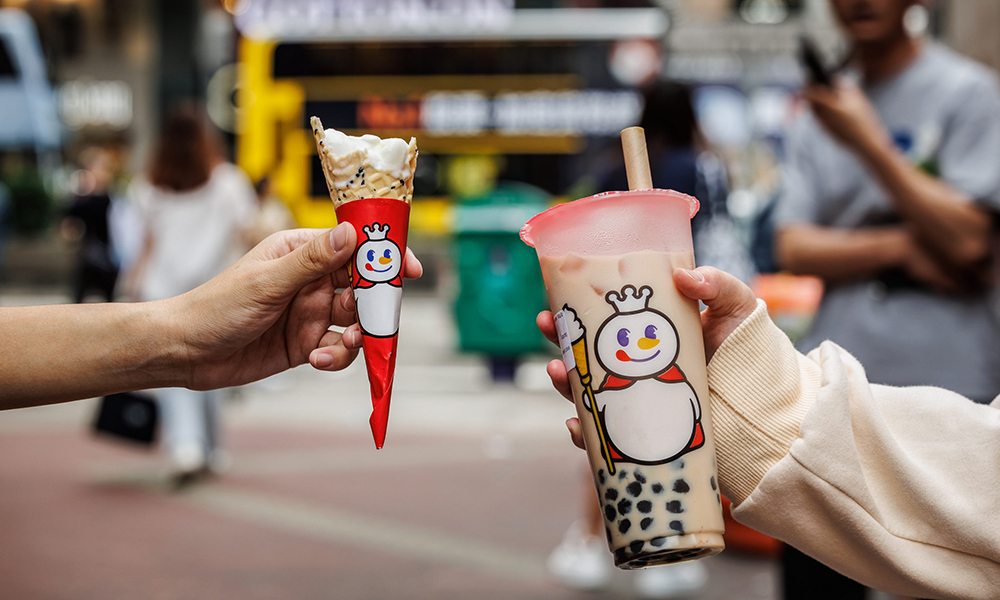
? 或許你會感到意外:全球最大的快餐連鎖品牌并非麥當(dāng)勞(McDonald’s)或星巴克(Starbucks)這類美國品牌,,而是1997年創(chuàng)立的蜜雪冰城——這家冰淇淋與奶茶店已在中國及整個亞洲迅速走紅,。創(chuàng)始人張紅超在大學(xué)期間便開設(shè)了第一家蜜雪冰城攤位,如今已躋身億萬富豪行列,。
麥當(dāng)勞于85年前在加利福尼亞州圣貝納迪諾市創(chuàng)立,。它是全球第二大私營雇主,規(guī)模僅次于今年再次榮登《財(cái)富》美國500強(qiáng)榜首的沃爾瑪(Walmart),,并且在全球擁有超4萬家門店,。
然而,就門店數(shù)量而言,,麥當(dāng)勞仍落后于一家公司——蜜雪冰城。
截至3月,,蜜雪冰城目前是全球門店數(shù)量最多的快餐連鎖品牌,,在亞洲、澳大利亞,、中東及南美洲擁有超4.6萬家門店,。其中約4萬家門店位于中國大陸,這意味著該公司在全球仍有巨大的擴(kuò)張空間,。自今年3月在香港證券交易所上市以來,,該公司表現(xiàn)強(qiáng)勁,股價(jià)從開盤價(jià)每股290港元飆升至周一早盤的584.50港元,。
28年前,,當(dāng)張紅超開設(shè)首家街邊小吃攤時(shí),或許從未預(yù)想到自己會成為一家行業(yè)巨頭的創(chuàng)始人,。
卑微起點(diǎn)
張紅超在河南財(cái)經(jīng)政法大學(xué)就讀期間萌生了開設(shè)小吃攤的念頭,,主要售賣冷飲、刨冰等飲品,。他向祖母借了3000元人民幣(按當(dāng)時(shí)匯率約合362美元,,如今約合417美元),在河南省會,、國際交通樞紐城市鄭州街頭開設(shè)了一個小攤位,。
這個攤位從早期就頗為成功。據(jù)新浪新聞對蜜雪冰城的長篇報(bào)道,,張紅超能將成本最高1.5元的產(chǎn)品賣出100元以上的高價(jià),;換言之,他制作一杯成本約21美分的飲品,,售價(jià)卻能超過14美元,。
令人惋惜的是,張紅超經(jīng)驗(yàn)上的欠缺以及鄭州的快速現(xiàn)代化成為了阻礙。新浪新聞報(bào)道稱,,隨著鄭州城市化進(jìn)程加快,,城中村持續(xù)面臨拆遷,他的攤位在一年內(nèi)竟接連三次被拆除,。而且,,他也深切感受到冬季售賣冷飲的艱難處境——這迫使他不得不靠售賣橘子來賺取額外收入。
打磨成功配方
盡管屢遭挫折,,張紅超仍堅(jiān)持不懈,。他購置更多設(shè)備,擴(kuò)充甜味飲品菜單,,并推出關(guān)鍵產(chǎn)品——僅售1元(約合14美分)的軟冰淇淋甜筒,,這使得該品牌在精打細(xì)算的消費(fèi)者中站穩(wěn)腳跟。
2007年,,弟弟張紅甫的加入,,讓公司的運(yùn)營能力實(shí)現(xiàn)了大幅提升。此前,,蜜雪冰城的加盟商多為親友,,管理制度鮮少被嚴(yán)格執(zhí)行;但自張紅甫(現(xiàn)任公司首席執(zhí)行官)接手后,,這種情況發(fā)生了改變,。(創(chuàng)始人張紅超擔(dān)任董事長。)他極為關(guān)鍵的一項(xiàng)舉措是引入店長,,這一做法最終助力兩兄弟規(guī)避了與經(jīng)營部分加盟店的家族成員間的糾紛,。
隨著門店數(shù)量在多年間擴(kuò)張至數(shù)百家,蜜雪冰城曾面臨品控一致性難題,,以及水果,、奶粉等原料短缺引發(fā)的供應(yīng)鏈危機(jī)。但張紅超通過推出珍珠奶茶等新品推動銷售額實(shí)現(xiàn)反彈,,并于2014年建立倉儲基地——直接從農(nóng)戶處收購原料,,并自主生產(chǎn)奶粉、零食等物料,,從根本上整合了大部分供應(yīng)鏈,,供應(yīng)問題也隨之得以緩解。
2022年,,蜜雪冰城已在22個省份建立倉儲物流基地,,并加強(qiáng)品控管理以規(guī)避門店關(guān)停風(fēng)險(xiǎn)。蜜雪冰城控制從門店選址,、裝修,,到人員培訓(xùn)、原料供應(yīng)、食品安全等環(huán)節(jié),,確保加盟商成功運(yùn)營,。
當(dāng)前業(yè)績
2024年,蜜雪集團(tuán)斬獲44億元人民幣(約合6.15億美元)利潤,,較上年增長22%,,營業(yè)收入達(dá)248億元人民幣(約合34.3億美元),同比增幅近40%,。其每股收益為12.3元人民幣(約合1.71美元),,較2023年增長41%。根據(jù)《金融科技與商業(yè)分析》近期發(fā)表的一項(xiàng)研究,,該公司垂直整合的供應(yīng)鏈及自有物流網(wǎng)絡(luò)使其成本僅占銷售收入的30%,,而行業(yè)平均水平為45%至55%。
關(guān)鍵在于,,這家企業(yè)仍在持續(xù)擴(kuò)張,。2024年新增4192家加盟店,新開門店數(shù)量超1萬家,,關(guān)店率僅為3.5%。
盡管其4.5萬余家門店中超99%為加盟店,,但加盟費(fèi)在收入中僅占較小比例,。據(jù)公司透露,收入主要來自向加盟商銷售商品與設(shè)備,,且加盟商必須直接從蜜雪冰城采購,。
今年早些時(shí)候,蜜雪冰城成功完成首次公開募股,,成為港交所年內(nèi)規(guī)模最大的首次公開募股,,募資34.5億港元(約合4.44億美元)。
至于張氏兄弟,,張紅超與張紅甫雖行事相對低調(diào),,但據(jù)報(bào)道二人合計(jì)身家高達(dá)81億美元。(財(cái)富中文網(wǎng))
譯者:中慧言-王芳
? 或許你會感到意外:全球最大的快餐連鎖品牌并非麥當(dāng)勞(McDonald’s)或星巴克(Starbucks)這類美國品牌,,而是1997年創(chuàng)立的蜜雪冰城——這家冰淇淋與奶茶店已在中國及整個亞洲迅速走紅,。創(chuàng)始人張紅超在大學(xué)期間便開設(shè)了第一家蜜雪冰城攤位,如今已躋身億萬富豪行列,。
麥當(dāng)勞于85年前在加利福尼亞州圣貝納迪諾市創(chuàng)立,。它是全球第二大私營雇主,規(guī)模僅次于今年再次榮登《財(cái)富》美國500強(qiáng)榜首的沃爾瑪(Walmart),,并且在全球擁有超4萬家門店,。
然而,就門店數(shù)量而言,麥當(dāng)勞仍落后于一家公司——蜜雪冰城,。
截至3月,,蜜雪冰城目前是全球門店數(shù)量最多的快餐連鎖品牌,在亞洲,、澳大利亞,、中東及南美洲擁有超4.6萬家門店。其中約4萬家門店位于中國大陸,,這意味著該公司在全球仍有巨大的擴(kuò)張空間,。自今年3月在香港證券交易所上市以來,該公司表現(xiàn)強(qiáng)勁,,股價(jià)從開盤價(jià)每股290港元飆升至周一早盤的584.50港元,。
28年前,當(dāng)張紅超開設(shè)首家街邊小吃攤時(shí),,或許從未預(yù)想到自己會成為一家行業(yè)巨頭的創(chuàng)始人,。
卑微起點(diǎn)
張紅超在河南財(cái)經(jīng)政法大學(xué)就讀期間萌生了開設(shè)小吃攤的念頭,主要售賣冷飲,、刨冰等飲品,。他向祖母借了3000元人民幣(按當(dāng)時(shí)匯率約合362美元,如今約合417美元),,在河南省會,、國際交通樞紐城市鄭州街頭開設(shè)了一個小攤位。
這個攤位從早期就頗為成功,。據(jù)新浪新聞對蜜雪冰城的長篇報(bào)道,,張紅超能將成本最高1.5元的產(chǎn)品賣出100元以上的高價(jià);換言之,,他制作一杯成本約21美分的飲品,,售價(jià)卻能超過14美元。
令人惋惜的是,,張紅超經(jīng)驗(yàn)上的欠缺以及鄭州的快速現(xiàn)代化成為了阻礙,。新浪新聞報(bào)道稱,隨著鄭州城市化進(jìn)程加快,,城中村持續(xù)面臨拆遷,,他的攤位在一年內(nèi)竟接連三次被拆除。而且,,他也深切感受到冬季售賣冷飲的艱難處境——這迫使他不得不靠售賣橘子來賺取額外收入,。
打磨成功配方
盡管屢遭挫折,張紅超仍堅(jiān)持不懈,。他購置更多設(shè)備,,擴(kuò)充甜味飲品菜單,,并推出關(guān)鍵產(chǎn)品——僅售1元(約合14美分)的軟冰淇淋甜筒,這使得該品牌在精打細(xì)算的消費(fèi)者中站穩(wěn)腳跟,。
2007年,,弟弟張紅甫的加入,讓公司的運(yùn)營能力實(shí)現(xiàn)了大幅提升,。此前,,蜜雪冰城的加盟商多為親友,管理制度鮮少被嚴(yán)格執(zhí)行,;但自張紅甫(現(xiàn)任公司首席執(zhí)行官)接手后,,這種情況發(fā)生了改變。(創(chuàng)始人張紅超擔(dān)任董事長,。)他極為關(guān)鍵的一項(xiàng)舉措是引入店長,,這一做法最終助力兩兄弟規(guī)避了與經(jīng)營部分加盟店的家族成員間的糾紛。
隨著門店數(shù)量在多年間擴(kuò)張至數(shù)百家,,蜜雪冰城曾面臨品控一致性難題,,以及水果、奶粉等原料短缺引發(fā)的供應(yīng)鏈危機(jī),。但張紅超通過推出珍珠奶茶等新品推動銷售額實(shí)現(xiàn)反彈,,并于2014年建立倉儲基地——直接從農(nóng)戶處收購原料,并自主生產(chǎn)奶粉,、零食等物料,,從根本上整合了大部分供應(yīng)鏈,供應(yīng)問題也隨之得以緩解,。
2022年,蜜雪冰城已在22個省份建立倉儲物流基地,,并加強(qiáng)品控管理以規(guī)避門店關(guān)停風(fēng)險(xiǎn),。蜜雪冰城控制從門店選址、裝修,,到人員培訓(xùn),、原料供應(yīng)、食品安全等環(huán)節(jié),,確保加盟商成功運(yùn)營,。
當(dāng)前業(yè)績
2024年,蜜雪集團(tuán)斬獲44億元人民幣(約合6.15億美元)利潤,,較上年增長22%,,營業(yè)收入達(dá)248億元人民幣(約合34.3億美元),同比增幅近40%,。其每股收益為12.3元人民幣(約合1.71美元),,較2023年增長41%,。根據(jù)《金融科技與商業(yè)分析》近期發(fā)表的一項(xiàng)研究,該公司垂直整合的供應(yīng)鏈及自有物流網(wǎng)絡(luò)使其成本僅占銷售收入的30%,,而行業(yè)平均水平為45%至55%,。
關(guān)鍵在于,這家企業(yè)仍在持續(xù)擴(kuò)張,。2024年新增4192家加盟店,,新開門店數(shù)量超1萬家,關(guān)店率僅為3.5%,。
盡管其4.5萬余家門店中超99%為加盟店,,但加盟費(fèi)在收入中僅占較小比例。據(jù)公司透露,,收入主要來自向加盟商銷售商品與設(shè)備,,且加盟商必須直接從蜜雪冰城采購。
今年早些時(shí)候,,蜜雪冰城成功完成首次公開募股,,成為港交所年內(nèi)規(guī)模最大的首次公開募股,募資34.5億港元(約合4.44億美元),。
至于張氏兄弟,,張紅超與張紅甫雖行事相對低調(diào),但據(jù)報(bào)道二人合計(jì)身家高達(dá)81億美元,。(財(cái)富中文網(wǎng))
譯者:中慧言-王芳
? It may surprise you to learn that the world’s largest fast-food chain isn’t an American staple like McDonald’s or Starbucks. It’s actually Mixue, an ice cream and boba shop founded in 1997 that has exploded in popularity in China and throughout Asia. Zhang Hongchao was a university student when he created the first Mixue stall; now he’s a billionaire.
McDonald’s was founded 85 years ago in San Bernardino, Calif. It’s the world’s second-largest private employer—behind only Walmart, No. 1 on the Fortune 500 again this year—and has over 40,000 locations worldwide.
Yet, McDonald’s still falls behind one company in terms of footprint: Mixue Ice Cream & Tea.
Mixue, as of March, is currently the world’s largest fast-food chain by store locations, with over 46,000 sites across Asia, Australia, the Middle East, and South America. Roughly 40,000 of its total locations exist in mainland China, meaning the company has even more room to run globally. And the company’s performed well since its March debut on Hong Kong’s stock exchange, soaring from its opening price of $290 HKD per share to $584.50 HKD as of Monday morning.
Zhang Hongchao probably didn’t expect to be the founder of such a behemoth when he opened his first street-food stall 28 years ago.
Humble beginnings
Zhang was attending the Henan University of Economics and Law when he had the idea to open a food stall, mainly to sell beverages like cold drinks and shaved ice. He asked his grandmother to borrow 3,000 yuan—around $362 back then, or $417 today—to open up a small stall on the streets of Zhengzhou, the capital of China’s Henan province and a major international transport hub.
The stall was successful, even early on. According to a lengthy profile about Mixue in China’s state-run outlet Sina News, Zhang was able to sell products worth up to 1.5 yuan for more than 100 yuan; in other words, he could make a drink that cost around 21 cents and sell it for more than $14.
Unfortunately, Zhang’s inexperience, and the rapid modernization of Zhengzhou, would become obstacles. The villages of Zhengzhou were constantly subject to demolition efforts as the area grew more urban, which resulted in Zhang’s store getting demolished three times in a single year, according to Sina News. And he learned the hard way how difficult it is to sell cold treats during the winter season, which forced him to sell mandarin oranges for extra cash.
Getting the formula right
Despite the setbacks, Zhang kept at it. He bought more machines, added more sugary drinks to his menu, and notably introduced a soft-serve ice cream cone for just 1 yuan, or roughly 14 cents, which solidified the brand among budget-conscious consumers.
The company also got stronger operational chops when Zhang brought in his younger brother, Hongfu, to help run the company in 2007. Since so many of Mixue’s franchisees were run by friends or family, few enforced Zhang’s rules or regulations; that changed when Hongfu, who now acts as the company’s CEO, took the reins. (Elder brother Hongchao Zhang, the founder, serves as chairman.) One of the most important things Hongfu did was introduce store managers, which ultimately helped the two brothers avoid disputes with family members who operated some of their franchises.
As Mixue added hundreds of stores over the years, the company grappled with quality and consistency issues, as well as supply-chain woes when fruits or milk powder ran in short supply. But sales rebounded as Zhang pushed for new products like boba tea, and supply issues were ameliorated when Zhang decided to establish a storage base in 2014 that would collect raw materials from farmers, and produce its own materials like powders and snacks, essentially consolidating a large portion of its supply chain.
In 2022, Mixue reported having warehouse and logistics bases in 22 different provinces, and the company has stepped up quality-control efforts to avoid store closures. Mixue controls site selection, store decoration, personnel training, raw material supply, and food safety to ensure the success of its franchisees.
Current success
In 2024, Mixue reported 4.4 billion yuan ($615 million) in profit, up 22% over the year before, on 24.8 billion yuan (about $3.43 billion) in revenue, which was a near-40% jump year over year. Its earnings per share, 12.3 yuan ($1.71), was also up 41% from 2023. The company’s vertically integrated supply chain and proprietary logistics network have helped keep costs low at just 30% of its sales revenue, compared to the industry average of 45%–55%, according to a recent study published in the Journal of Fintech and Business Analysis.
Crucially, the company continues to expand. It added 4,192 new franchisees in 2024 and opened over 10,000 new stores, with a closure rate of just 3.5%.
While over 99% of its 45,000-plus stores are franchised, franchise fees only make up a small percentage of its revenue. According to the company, the bulk of its income comes from selling merchandise and equipment to franchises, which are required to buy these items directly from Mixue.
Earlier this year, Mixue celebrated a successful initial public offering, the biggest IPO of the Hong Kong Stock Exchange so far this year, raising $3.45 billion HKD, or $444 million.
As for the Zhang brothers, Hongchao and Hongfu maintain relatively low profiles, but reportedly have a combined net worth of $8.1 billion.






